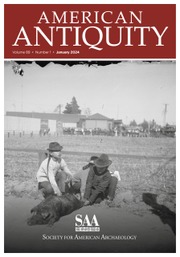Crossref Citations
This article has been cited by the following publications. This list is generated based on data provided by Crossref.
Yesner, David R.
1978.
Animal bones and human behavior.
Reviews in Anthropology,
Vol. 5,
Issue. 3,
p.
333.
Steadman, Dawnie Wolfe
DiAntonio, Lisa L.
Wilson, Jeremy J.
Sheridan, Kevin E.
and
Tammariello, Steven P.
2006.
The Effects of Chemical and Heat Maceration Techniques on the Recovery of Nuclear and Mitochondrial DNA from Bone*.
Journal of Forensic Sciences,
Vol. 51,
Issue. 1,
p.
11.
Dewbury, Adam G.
and
Russell, Nerissa
2007.
Relative frequency of butchering cutmarks produced by obsidian and flint: an experimental approach.
Journal of Archaeological Science,
Vol. 34,
Issue. 3,
p.
354.
Simonsen, Kim P.
Rasmussen, Arne R.
Mathisen, Pernille
Petersen, Henriette
and
Borup, Flemming
2011.
A Fast Preparation of Skeletal Materials Using Enzyme Maceration*.
Journal of Forensic Sciences,
Vol. 56,
Issue. 2,
p.
480.
King, Christine
and
Birch, Wendy
2015.
Assessment of Maceration Techniques Used to Remove Soft Tissue from Bone in Cut Mark Analysis.
Journal of Forensic Sciences,
Vol. 60,
Issue. 1,
p.
124.
Nikolaev, Anton
Bazhenov, Vasilii V.
Frank-Kamenetskaya, Olga V.
and
Petrova, Olga V.
2017.
Extreme Biomimetics.
p.
81.
Maidment, Catherine
and
Williams, Anna
2023.
Comparison of common maceration techniques to prepare porcine bone for fluorescence analysis using alternative light sources (ALS).
Forensic Imaging,
Vol. 34,
Issue. ,
p.
200556.


